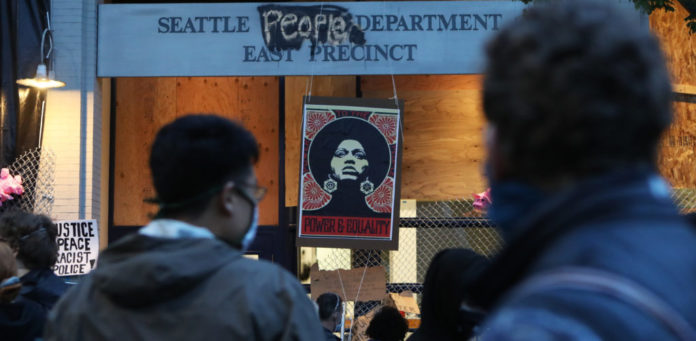
A federal judge has ruled that several former and current Seattle officials were involved in the 2020 Capitol Hill Organized Protest/Capitol Hill Autonomous Zone. These individuals, better known as CHOP and CHAZ, deliberately “purged” evidence-related text messages. The jury that will ultimately consider a case about the event could conclude that the missing text messages were not favorable to the city or to those involved.
A rogue group leftist activists affiliated with Black Lives Matter surrounded six to eight blocks of Capitol Hill in Seattle on June 8, 2020. They declared the area an “autonomous Zone,” a quasi-sovereign, independent state. As violence escalated, however, the infrastructure in the zone collapsed quickly. The protest was stopped by Seattle police on July 1. CHOP was dismantled, leaving behind two teenagers dead and many severely injured victims.
Dave Rubin’s content is free from big tech censorship. The Rubin Report is now available.
However, physical violence wasn’t the only damage that CHOP did. Businesses in the occupied territory sustained serious damage to their bottom lines, not to mention the integrity of their buildings. Because protesters refused to let employees or clients access their buildings, they suffered severe injury. More than a dozen businesses filed a lawsuit against city officials claiming that they had provided various accommodations for the protesters including portable toilets, washing stations and dumpsters. A federal judge has ruled that the lawsuit can be brought to trial.
U.S. District Judge Thomas Zilly, who sided with plaintiffs in two of the key lawsuit counts, dismissed three others. Zilly will allow the jury to decide whether city officials, including Jenny Durkan (D), former Chief Carmen Best of police, and fire Chief Harold Scoggins, were responsible for “taking” public access to these establishments.
Zilly’s 39-page order was centered on text messages that were missing from “City-owned phones” and had been given to these public officials for their use. Although the plaintiffs’ attorneys sent several letters to the city asking for their records, almost all the text messages on many of their phones were deleted.
A city attorney discovered on August 21, 2020 that Durkan had deleted all her texts from both her old and new phones. Durkan claimed she dropped her phone in the water on July 4. Durkan claimed that her phone was damaged but that it still functioned enough for her to power it up and restore the data to the iCloud. Durkan also claimed that she did a reset of her phone and accidentally selected a “Disable & Delete” option. This ended the synchronization between her phone and the iCloud. Durkan then began deleting any text messages older than 30 days.
She received a new phone on July 7. “Someone” had set it to continue the 30-day deletion option. This caused more than 5,700 text messages to be permanently deleted. Her data from her old phone was never backed up. Zilly stated in his order Durkan’s “various motives for deleting her texts messages strain credibility.”
Six months after Best submitted her resignation, a similar discovery was made about Chief Police Officer Best’s phone. According to court documents, Best deleted over 27,000 text messages manually before giving the phone back to the police chief. Best later stated that she deletes text messages from her phone every so often, but she didn’t recall ever deleting all her messages before she returned the phone to the city. Best claimed that, just like the emails sent from city-issued addresses, all data on city-issued phone numbers always had a backup copy. Officials later blamed COVID work requirements for failing to discover the missing messages until March 2021.
Scoggins didn’t discover that Scoggins had deleted his texts until February 2021. This was several months after he entered the wrong passcode too many time and locked the phone. According to the court document, Scoggins took his phone to Apple Store in October 2020 to have it serviced. “An employee reset the device and deleted all previous messages”, the court document said.
Experts have been able re-create more than 160,000 messages that were lost to recipients but not one text message between Durkan, Best and Scoggins between June 8, 2020 and July 1, 2020 has been found.
Zilly wrote that on January 13th, “City officials deleted thousands upon thousands of text messages from city-owned phones in total disregard of their legal obligation of conserving relevant evidence.”
He said that “the Court finds substantial circumstantial evidence” that the city had the intent to impose severe sanctions and that the city’s conduct was more than gross negligence.
Zilly stated that jury will hear case against city officials for plaintiff businesses. “May presume that text messages sent by City officials (deleted after Plaintiffs filed this action) were not favorable to the City. Plaintiffs will be permitted to present evidence and argue at trial concerning the City’s removal of the text messages.”
Zilly also ruled that the city had to pay the expenses incurred in recovering these text messages. Zilly also ruled that Hunter Capital must pay the costs of the investigation into the deleted text messages from CEO Michael Malone’s phone. Malone’s deletions could also be mentioned in court.
Zilly dismissed the suit’s allegations regarding negligence, illegally taking plaintiffs’ property, civil rights, as well as the contention that plaintiffs were denied due process. Plaintiffs claimed that CHOP caused them property damage and lost earnings of $3 million.



